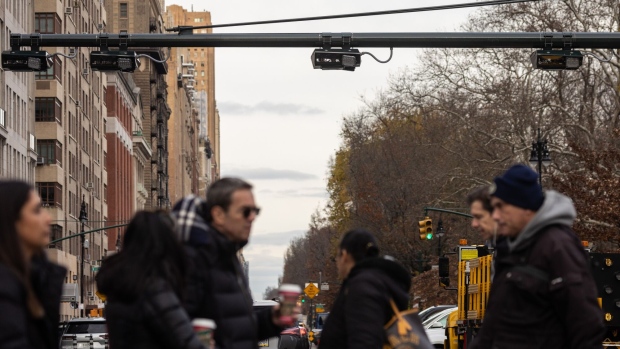Mar 22, 2024
New York’s MTA Poised to Vote on Congestion Pricing Fee
, Bloomberg News

(Bloomberg) -- The US’s first-ever congestion pricing toll is set to move forward as New York’s Metropolitan Transportation Authority plans to hold a vote next week on the new fees, according to two people familiar with the transit agency’s plans.
Congestion pricing will charge motorists a toll driving into Manhattan’s central business district, which runs south of 60th Street. Drivers could begin paying the new fee as soon as mid-June. The MTA is implementing the program and plans to use the estimated $1 billion a year of new revenue from the tolls to modernize subway signals, add more elevators to stations and extend the Second Avenue subway into Harlem.
Transit agency officials expect to include the vote as part of its planned monthly board meeting on March 27, according to the people, who declined to speak publicly about the MTA’s plans since the meeting agenda has yet to be made public.
It would be the transit agency’s first opportunity to conduct a tally on the plan following a public-comment period that ended on March 11. That process included public hearings where people voiced their support or opposition to the new toll.
The MTA did not provide a comment regarding the timing of the vote.
Under the proposed tolling structure, E-ZPass motorists will be charged $15 during peak periods for passenger cars, and $24 for trucks. Drivers who already pay tolls on certain crossings to get into Manhattan will receive credits to help lower the congestion pricing fee. Taxi passengers will pay $1.25 and for-hire vehicle passengers taking Uber or Lyft will pay $2.50
The goal of congestion pricing is to reduce traffic in one of the most-clogged areas in the US, improve air quality and give the MTA a new funding source to help upgrade a more than 100-year-old transit system. Opponents of the toll say it will strain the district’s residents, who would have to pay just to return home, and small businesses, which would have to absorb the cost or pass it on to customers.
Read More: Love It or Hate It: New Yorkers Weigh In on Congestion Tolling
State lawmakers authorized the congestion pricing initiative in 2019 and tasked the MTA with carrying out the plan.
If MTA’s board approves congestion pricing, the transit agency will only need a final sign off from the Federal Highway Administration to start imposing the new toll. But several lawsuits threaten to delay the mid-June start. New Jersey Governor Phil Murphy, Staten Island Borough President Vito Fossella, a group of district residents and the United Federation of Teachers have all sued seeking to prevent or delay it.
Those legal challenges have forced the MTA to freeze most of its capital plan, putting on hold signal replacement work on subway lines in Manhattan and Brooklyn, which would improve service for 1.5 million riders a day. Also at risk are accessibility projects at 20 different subway stations, $1 billion of funding for new subway trains to replace cars from the 1980s and the purchase of 270 electric buses.
Read More: Key NYC Subway Repairs Put at Risk From Congestion Toll Lawsuits
©2024 Bloomberg L.P.






